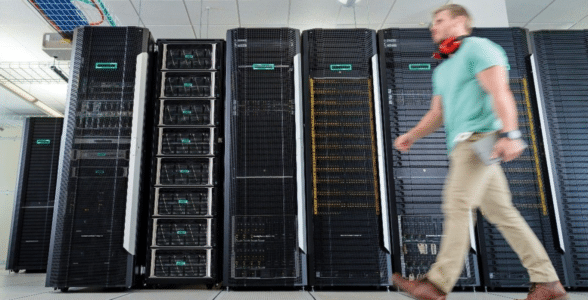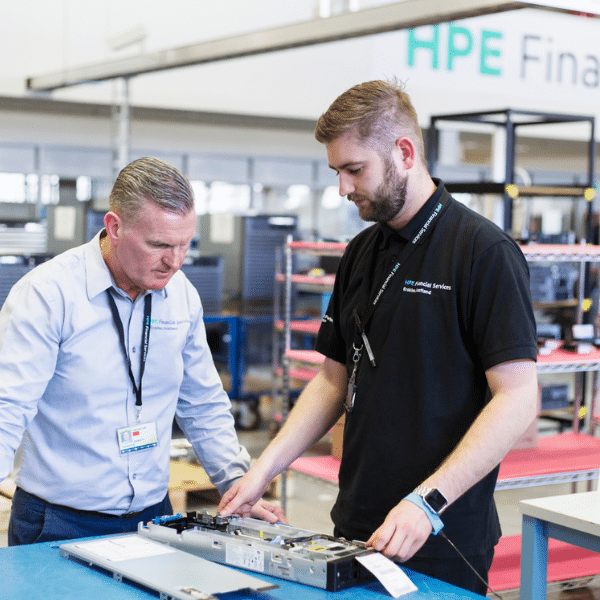
Ashley O'Connor
Marketing Executive
March 7, 2024
Technology is an essential aspect of modern British society; promoting innovation, improving quality of life, and contributing to the prosperity of the country. Computing empowers academic research institutions across disciplines such as genome research, biomedical research, and data science to make ground-breaking discoveries that advance society.
However, it is important to address the impact that technology has on the environment through its enormous demand on energy and natural resources. Data centres, networks and end-user devices are estimated to have accounted for 4-6% of global electricity consumption in 2020. And in 2022, the UK produced the second most e-waste per-capita in the world.
In this article, we’re focusing on the environmental challenges that UK universities face when procuring, utilising and disposing of technology, and the steps DTP group and our partners are taking to solve concerns surrounding e-waste, carbon emissions and supply chain impact.
E-Waste
The UK is one of the world’s largest contributors to e-waste. Research from the UN found that the UK generates the second highest amount of e-waste per capita at 23.9kg of e-waste, far exceeding the world average of 7.3kg per capita. Between 2008 and 2022, IT and telecoms e-waste almost doubled in the UK.
In 2020, a UK Government report on electronic waste highlighted some shocking statistics: if recycled, the unused laptops in the UK could create “159,000 bikes, 12,000 playground swings and 5 million defibrillators”. While unused wires could wrap around the earth 5 times.
The UN estimates that only 42% of e-waste in Europe is collected to be recycled, while an article from the Financial Times claims it is as low as 20% in the UK. And when e-waste is disposed of at recycling centres, it is often recycled through low quality methods such as shredding, leading to the loss of highly engineered components and valuable materials.
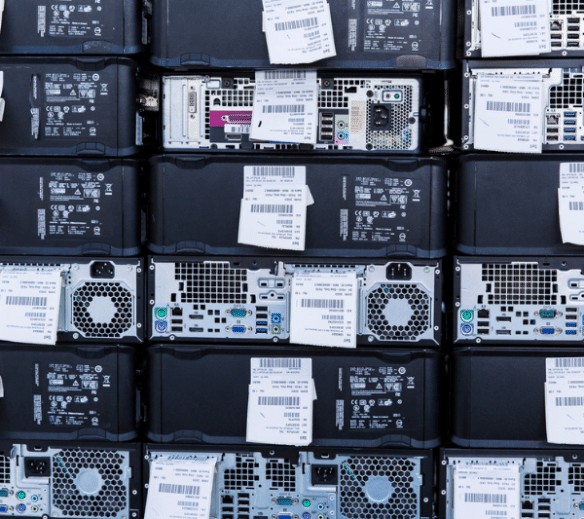
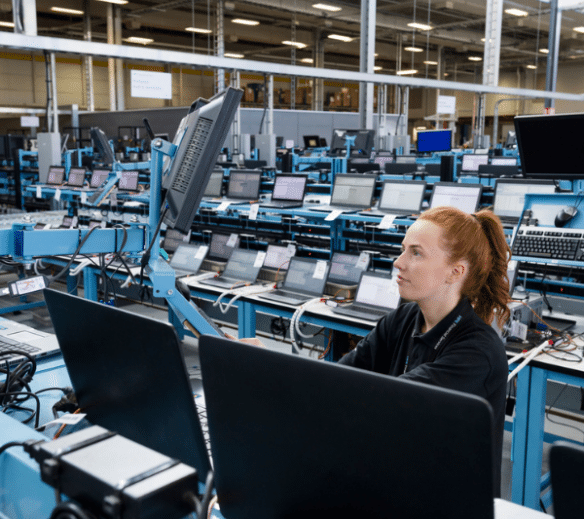
Creating a Circular Economy
Due to the scale of the e-waste problem in the UK, DTP aspires to achieve a circular lifecycle for the IT devices we distribute. Our close relationship with HP and HPE means that our university customers can responsibly dispose of their IT equipment in a way that ensures a high percentage of these devices will return to the market. Additionally, our customers can purchase equipment refurbished or upcycled from end-of-life devices and components.
Unlike regular recycling plants, HPE’s Technology Renewal Centre in Erskine, Scotland upcycles IT assets at high efficiency. In 2022 alone, HPE’s specialised plant processed over 3.6 million IT assets, remarketing 82% for a second life.
Over the last three years, HPE Technology Renewal Centres have globally returned over 3.1 million personal computers, 2.4 million servers and compute assets, and close to 800,000 storage devices back to active use.
Learn moreOur print and end-user compute partner, HP has also adopted the use of recycled materials in the manufacturing process for brand-new devices, printers and supplies. For example, the newest HP Dragonfly and Elite 1000 PCs contain 90% recycled magnesium in the enclosure case, ocean-bound plastic in the speaker enclosure, and bio-circular feedstock such as used cooking oil, to reduce CO2 emissions.
Many tech companies focus on a linear business model, reliant on continuous consumption, short-lived products and a throw-away culture. Our partners HP and HPE promote a truly circular model, repurposing end-of-life IT assets to eliminate e-waste and incorporating the use of recycled materials such as ocean bound plastics in the manufacturing stage of new products. These efforts reduce the demand on natural resources, and the knock-on emissions generated through mining, manufacturing and supply chain.


Carbon Emissions
Higher Education institutions across the UK contribute over 18 million tonnes of carbon dioxide emissions yearly, equating to 2.3% of the UK’s overall footprint. To visualise this, a 2023 report published by DTP Group found that the annual carbon generated by UK universities is the equivalent to 665 landfills: the same as leaving 813,774 car engines running for a whole year.
Technology procurement presents a valuable opportunity for universities to reduce their direct and indirect carbon emissions. Researchers estimate that IT constitutes 2-4% of global greenhouse gas emissions. At DTP Group, we understand that we must work with our partners and customers to reduce this impact.
Reducing Device Emissions
The UK Government estimates that end-user devices consume more energy than networks and data centres combined. This means end-user devices such as laptops, tablets and desktop computers present a valuable opportunity to reduce energy consumption and carbon footprint.
Energy Efficiency
Currently, most UK universities still rely on traditional fossil fuel energy supplies, making it essential to reduce energy consumption. As DTP partners with HP, we guarantee our customers are able to access some of the most energy efficient devices on the market. HP has over 790 ENERGY STAR certified devices and printing products – more than any other manufacturer. ENERGY STAR products guarantee minimal energy waste and lower energy costs over the life of a device.


Responsible Carbon Offsetting
UK universities purchasing end-user compute through us also have the option to offset the lifetime emissions of their devices, through our DTP Zero Compute initiative. This scheme enables universities to accurately calculate the impact of their fleet and offset the carbon footprint of their entire fleet at the point of purchase.
DTP Zero Compute covers 100% of your end user device fleets’ activities – so for every kW of electricity used to power the device and every delivery we make to you – we’ll ensure that all emissions are offset through investments in rigorously vetted socially conscious projects.
Currently the UK only has 13% of tree coverage, but to meet the current goal to be net zero by 2050, it must reach 19%. To offset our customer devices, we plant trees in a native woodland local to our HQ in Yorkshire. Tom’s Wood in York supports local biodiversity and improves woodland connectivity in the surrounding area.
Reducing Print Emissions
Contributing to a significant share of carbon emissions, creating demand on scarce resources, and generating substantial waste, printing is another key area that organisations should focus on in efforts to reduce their environmental impact.
HP print solutions are independently recognised as one of the most environmentally friendly on the market. By opting for HP managed print services, universities are empowered to reach their targets, reducing print GHG emissions by up to 12% and increasing resource efficiency by up to 12%.
HP Print Sustainability
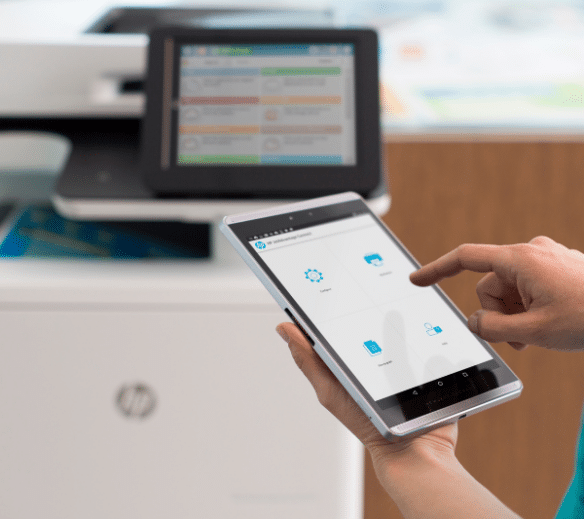
Responsible Carbon Offsetting
We also offer carbon offsetting for print through our DTP Zero Print programme. In partnership with HP’s certified carbon neutral Managed Print Service, DTP Zero Print offsets the entire carbon footprint of your printer fleet.
DTP Zero Print impressively covers 100% of your fleets’ activities – so for every page printed, every kW of electricity used to turn the printer on, every ink cartridge delivered to you in the post or by courier – we’ll work closely with HP to offset all emissions through investments in rigorously vetted socially conscious projects.
DTP Zero Print Brochure
Green Data Practices
It’s no secret that networks and data centres are a large drain on electricity. Universities aiming to reduce their direct emissions should focus on keeping their infrastructure up to date, adopting green data practices and gaining 100% control and visibility over all their assets.

-
Energy Efficiency
Hewlett Packard Enterprise has been frequently recognised on a global level for their innovations in sustainable product manufacturing. In June 2022, 96 HPE systems made the Green 500 list of the world’s most energy-efficient super computers. And similar to HP, many of HPE’s products are certified by ENERGY STAR, guaranteeing low energy consumption.
-
Visibility and Control
HPE recently announced their GreenLake sustainability dashboard. This view will enable HPE GreenLake customers – such as the University of Stirling – to monitor, manage and control energy consumption across their entire infrastructure.
New technology from OpsRamp, which HPE acquired in 2023, provides an additional dimension of capabilities, allowing customers to obtain visibility of their resources spread across different environments and vendors, such as AWS.
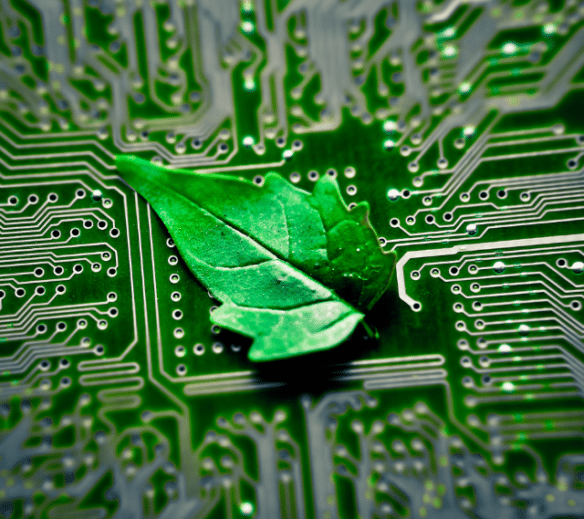
The University of Huddersfield
A 2023 proposal for climate action in the Education Section published by The Royal Anniversary Trust highlighted a solution we delivered to the University of Huddersfield as a best practice. The case study highlighted that power demand at the university was reduced by 46% as a result of adopting a hybrid cloud approach.
We worked with the University of Huddersfield to support them on their journey to become carbon neutral by 2030, by implementing a hybrid cloud strategy. The university required an extremely reliable, highly energy efficient on-premises data centre, mixed with public cloud services availability.
Read the Success StorySupply Chain
88% of UK university emissions are a result of scope 3, “indirect emissions from value chain”. Of this share, supply chain accounts for around 36%. On average, emissions from supply chain are 11 times greater than the emissions from an institution’s own operations. Opting for sustainably motivated suppliers and manufacturers is vital to reduce this huge share of footprint.
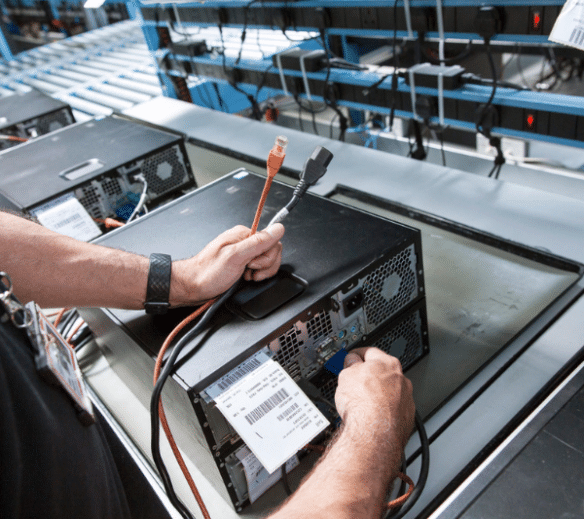
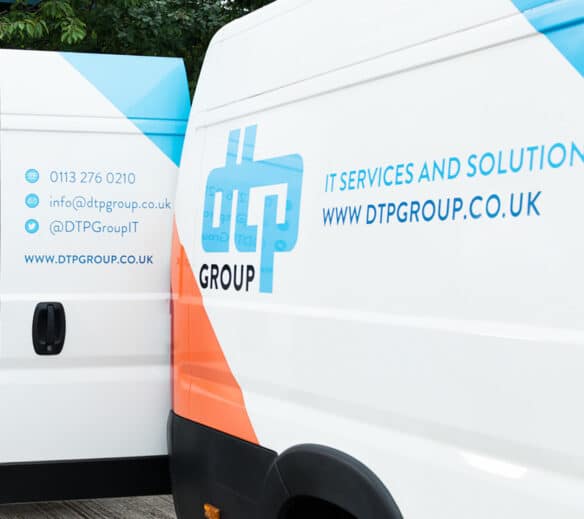
DTP Group together with HP & HPE
DTP Zero is our internal commitment to become carbon-neutral by 2025. We are a proud member of the SME Climate Hub which helps us leverage best practices from world leading organisations and formalises our commitment. Additionally, we have sent 0% of waste to landfill since 2019.
HP were the first global IT organisation to publish a full carbon footprint and continue to measure their entire value chain. As a HP only IT reseller, we share the vision for a net zero technology industry, and we allow full transparency of our operations to retain our status as a key HP partner. Year on year, we have retained our status as a top partner on the Amplify Impact programme, and in 2023 we achieved a 3* award for our efforts in sustainability.
DTP Zero
Our partners
With sustainability first becoming a corporate objective for HP in 1957, it is no surprise that they are one of the most sustainable manufacturers in the IT industry. In 2022, HP reported a 18% decrease in their footprint over three years, in line with their target reach net zero across their entire value chain by 2040. This decrease included a 7% reduction in manufacturing and a 31% decrease in product energy use.
In terms of circularity, HP have recycled more than 879,100 tonnes of hardware and supplies since 2016. The manufacturer has also diverted 18.7 million plastic bottles worth of ocean bound plastics through use in 277 personal systems products since 2019. In 2022, HP used 32,000 tonnes of post-consumer recycled plastic in HP products and achieved 86.7% landfill diversion rate globally.
There are too many impressive initiatives and statistics to mention in one article, so we recommend that you look at HP’s in-depth sustainable impact report for 2022.
HP Sustainable Impact Report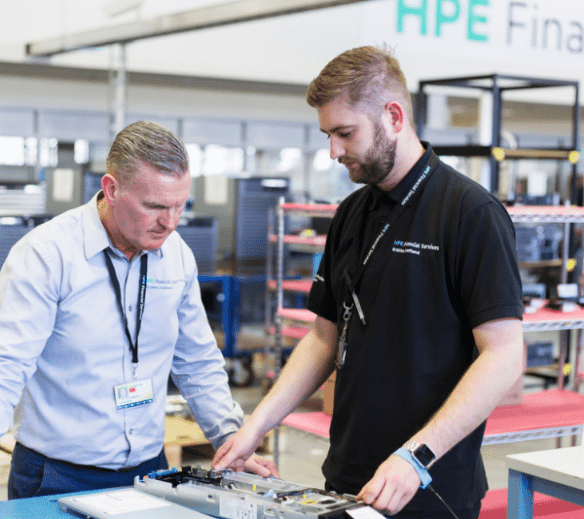

Hewlett Packard Enterprise are one of just two global tech companies with a 2040 net-zero target approved by the Science-based Target Initiative. In just two years, HPE’s operational emissions decreased 21%, in line with their target to decrease by 70% between 2020 and 2030. To achieve this, they surpassed their 2025 target of sourcing 50% renewable electricity three years ahead of schedule. Additionally, HPE run a number of technology renewal centres as mentioned above. In 2023, 93% of servers processed at the Erskine Technology Renewal Centre were successfully upcycled and returned to use.
HPE Global Progress Report
Ready to reduce your university’s environmental impact?
As one of the leading technology suppliers to UK education, we’ve been chosen by some of the largest Russel Group Universities and research institutions to deliver sustainable IT solutions.
Opting to procure your technology through us and our carefully selected partners guarantees a transparent and sustainable supply chain, allowing institutions to reduce their indirect value chain emissions.
We also empower our customers to reduce their direct impact through our DTP Zero Print and Compute offsetting schemes, energy efficient product ranges, and powerful asset monitoring tools.
Finally, our partnership with HPEFS allows us to promote a truly circular economy and the reduce the scale of the e-waste problem in the United Kingdom.
View Full Services Brochure


